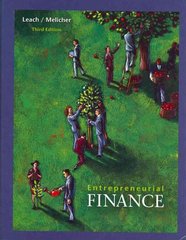Question
The interest rate used to compute the future value of a future cash flow is called the: prime rate. simple rate. discount rate. compound rate.
- The interest rate used to compute the future value of a future cash flow is called the:
- prime rate.
- simple rate.
- discount rate.
- compound rate.
2. Which one of the following statements is correct, all else held constant?
- There is an inverse relationship between the present value and the future value.
- The future value increases as the time period increases.
- The interest rate is directly related to the present value.
- The present value increases as the time period increases.
3. Given an interest rate of 0%, the future value of a lump sum invested today will always:
- remain constant, regardless of the investment time period.
- decrease if the investment time period is shortened.
- decrease if the investment time period is lengthened.
- be equal to $0.
4. Which of the following will increase the future value of a lump sum investment made today assuming that all interest is reinvested (compounding interest)? Assume the interest rate is a positive value.
I. Increase in the interest rate
II. Increase in the lump sum amount
III. Increase in the investment time period
IV. Decrease in the investment time period
- I and III only
- I and IV only
- I, II, and III only
- II and III only
5. Which one of the following is a correct statement, all else held constant?
- The present value is inversely related to the future value.
- The future value is inversely related to the period of time.
- The present value is positively related to the discount rate.
- The future value is positively related to the interest rate.
6. Your savings account is currently worth $5,000. The account pays 5.5% interest compounded annually. How much will it be worth 3 years from now?
- $5,543.6
- $5,871.2
- $5,978.9
- $5,998.2
7. David wants to have $25,000 three years from now to buy a new car. He wants to make one deposit today to fund this expenditure. How much does he have to deposit if he can earn 3.6% per year on his savings?
- $19,908.2
- $20,255.2
- $22,483.3
- $25,211.4
8. What is the future value of $10,000 invested at 12%, compounded monthly for 5 years? ______
- $15,000
- $16,875
- $17,674
- $18,167
9. You have just received a prize worth $10,000. You deposited your winnings into an account which pays 6% annual interest compounded monthly. How long will you have to wait until your winnings are worth $25,000?______
- 12.5
- 13.3
- 14.6
- 15.3
10. You have $1,000 today and want to double your money in 10 years. What interest rate must you earn (compounded yearly)? ________
- 7.18%
- 8.05%
- 9.20%
- 10.53%
Step by Step Solution
There are 3 Steps involved in it
Step: 1

Get Instant Access to Expert-Tailored Solutions
See step-by-step solutions with expert insights and AI powered tools for academic success
Step: 2

Step: 3

Ace Your Homework with AI
Get the answers you need in no time with our AI-driven, step-by-step assistance
Get Started


